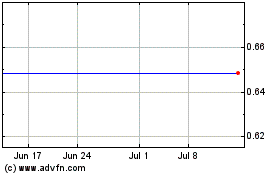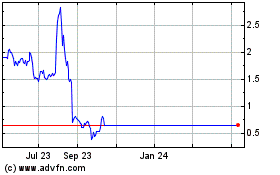Walgreens Again Trims Deal for Rite Aid But Finally Gains Approval -- 2nd Update
September 19 2017 - 12:13PM
Dow Jones News
By Brent Kendall and Austen Hufford
Walgreens Boots Alliance Inc. received regulatory approval for
its deal to buy nearly 2,000 stores from Rite Aid Corp., but only
after the number of stores to be purchased was again trimmed to
allay antitrust concerns.
Walgreens will now buy 1,932 Rite Aid stores for $4.38 billion,
a far cry from the original $9.4 billion deal for about 4,600
stores, struck in 2015. The Federal Trade Commission spent roughly
18 months investigating the companies' broader plan to merge and
harbored an array of concerns that the deal would unacceptably harm
competition.
In the face of continued FTC objections, the two companies
scrapped their merger plans in June, agreeing instead that
Walgreens would seek to buy about 2,200 Rite Aid stores.
After further discussions with the FTC, the companies dropped
about another 250 stores from the transaction, Rite Aid said
Tuesday.
Rite Aid will continue as a stand-alone company, operating about
2,600 stores, six distribution centers and its pharmacy-benefit
manager, EnvisionRx.
Walgreens Chief Executive Stefano Pessina said the deal "is
expected to help us achieve enhanced, sustainable growth while
enabling us to broaden our reach and provide greater access to
convenient, affordable care in more local neighborhoods across the
United States."
The deal has been approved by the boards of both companies and
doesn't require a shareholder vote. Store transfers will start in
October, with the goal of completing the transition in the spring
of next year.
The FTC has been reviewing the drugstore chains' proposed
transaction short-handed. There are only two current commissioners
on the five-member commission, one Republican and one Democrat.
Both commissioners had objections to the original merger proposal,
but their views diverged on the scaled-back transaction.
Acting Chairwoman Maureen Ohlhausen, a Republican, said Tuesday
the stores now being sold are located in areas where the two
pharmacy chains aren't significant competitors "and in some places,
different types of retail pharmacy providers, such as mass
merchants or supermarkets like Kroger and Wal-Mart, are significant
competitors."
Ms. Ohlhausen said she believed Rite Aid "will remain a robust
competitor in the areas where its presence matters in the formation
of retail pharmacy networks, and it will retain most or all of its
stores in those areas."
The Democratic commissioner, Terrell McSweeny, said she objected
to allowing the current deal without studying the effects of the
revised transaction in more detail. She said the store sales would
eliminate Rite Aid's geographic footprint in certain regions,
leaving just Walgreens and CVS Health Corp.
Ms. McSweeny said the current deal was better than the previous
proposals and eliminated "many of the most obvious harms to
competition." But she said she was concerned the transaction "will
leave some communities with fewer pharmacy options and could lead
to higher drug prices and a deterioration in non-price aspects of
competition."
Write to Brent Kendall at brent.kendall@wsj.com and Austen
Hufford at austen.hufford@wsj.com
(END) Dow Jones Newswires
September 19, 2017 11:58 ET (15:58 GMT)
Copyright (c) 2017 Dow Jones & Company, Inc.
Rite Aid (NYSE:RAD)
Historical Stock Chart
From Mar 2024 to Apr 2024

Rite Aid (NYSE:RAD)
Historical Stock Chart
From Apr 2023 to Apr 2024
